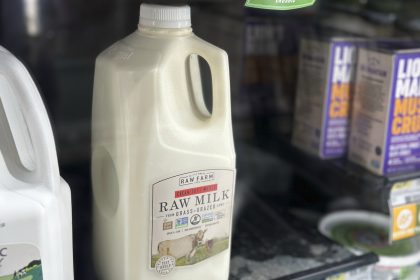Do You Need to Cut Carbs to Be Healthy?

WASHINGTON — Over the years, diet trends have come and gone. Every few decades, a new macronutrient becomes a villain. Low-fat and fat-free products were once all the rage. Next, we moved into Atkin’s, keto, and paleo diets — all with one thing in common: cutting out carbohydrates to lose weight.
Whether you want to lose weight or eat healthier, you may have wondered about the truth behind these “diets.” Here, we’ll explain the science behind types of carbohydrates, how they may contribute to weight, and list some healthy carb options to help you feel your best.
Carbs Are An Energy Source
Carbohydrates are one of the three macronutrients, along with protein and fat. Each macronutrient provides energy and is essential to a healthy diet. Carbs, in particular, are an energy source that help control your blood sugar, insulin, and metabolism.
When you eat carbohydrates, your body stores them as glucose (sugar) to use for energy. Some people like to eat carbohydrates before a workout because their bodies can immediately use glucose as an energy source. After a workout, it’s helpful to eat carbohydrates again to refill your stored energy. You also need protein after a workout to repair your muscles.
Your brain also uses carbs for energy for focusing, work, and daily tasks.
Simple Carbs Versus Complex Carbs
There are two main types of carbohydrates: simple carbs and complex carbs. When people talk about “cutting carbs,” they are usually referring to simple carbs like french fries, white bread, and processed foods.
Simple carbs are called simple because they usually contain one sugar molecule, while complex carbs contain three or more. Simple carbs cause a blood sugar spike and get rapidly digested. Complex carbs gradually release energy over time and get digested slowly. They typically contain more fiber and other nutrients.
Do Carbs Cause Weight Gain?
Generally speaking, weight gain occurs when you take in more energy (calories) than you expend. You expend energy and burn calories just by living your daily life, and you can burn more by exercising. However, it’s not always a perfect science. Some people have health, hormonal and metabolic conditions where the “calories in, calories out” equation doesn’t work.
If you hear that a diet helps you lose weight by “cutting carbs,” it may be that it eliminates foods high in calories that happen to have carbs in them. There is nothing magical about a carbohydrate that makes it more likely to cause weight gain.
However, since carbohydrates get stored as sugar meant to be burned as energy, it’s possible that eating high-calorie, high-carbohydrate foods without exercising could lead to weight gain. Extra glucose from carbohydrates not used for energy remains in your bloodstream, liver and muscles.
Carbs and Weight Loss
Weight loss is a tricky subject. Many diets and products promise the perfect solution, but the unfortunate truth is there is no such thing.
When it comes to cutting out carbs or any food group, research shows that restricting food on a diet hinders weight loss and often leads to weight gain. Psychologically, telling yourself that you can’t have something can make you want it more. While you may be able to stick with it for a little while, it’s often unsustainable.
Consult a Professional
If you want to lose weight or eat healthier, checking in with your doctor is a great start. You can also see a registered dietitian who can examine your blood work and tell you if there is a medical reason to limit carbs. They can also help you with personalized nutrition advice. A mental health professional can also help you with the psychological side of eating.
General Guidelines
If you try exercising a little more and eating a little less — and if you have no other medical conditions — keep carbs in your diet. In fact, add more of them. If you’re trying to stick to a certain number of calories, include whole foods that contain protein, fat, and carbs to keep you nourished, energized, and satisfied.
Simple carbohydrates are not just processed french fries and pizza; they also include many fruits, white rice and dairy products. An apple, for example, is a simple carb, but it contains fiber and nutrients to keep you full.
Including complex carbs in your diet will give you energy for longer. Choose whole food sources of complex carbs. Here are a few examples:
- Brown Rice.
- Sweet Potatoes.
- Whole Grain Bread.
- Whole Grain Pasta.
- Lentils.
- Legumes.
- Chickpeas.
- All vegetables.
Carbs Are Not Evil
Don’t get swept up in the latest diet trends — carbohydrates are simply a macronutrient that provides energy. Cutting out a food group, if you don’t have a medical reason, can hinder your efforts to lose weight or eat healthier. Include healthy sources of carbs in your diet, like fruits, vegetables and whole grains.
You can reach us at [email protected] and follow us on Facebook and X (formerly known as Twitter)

























